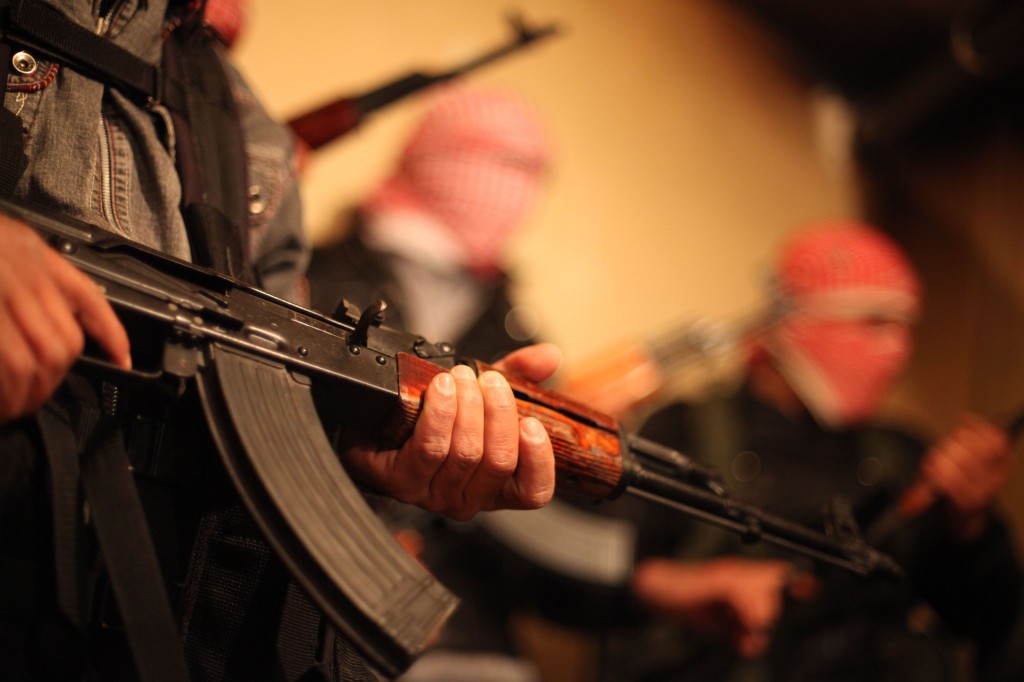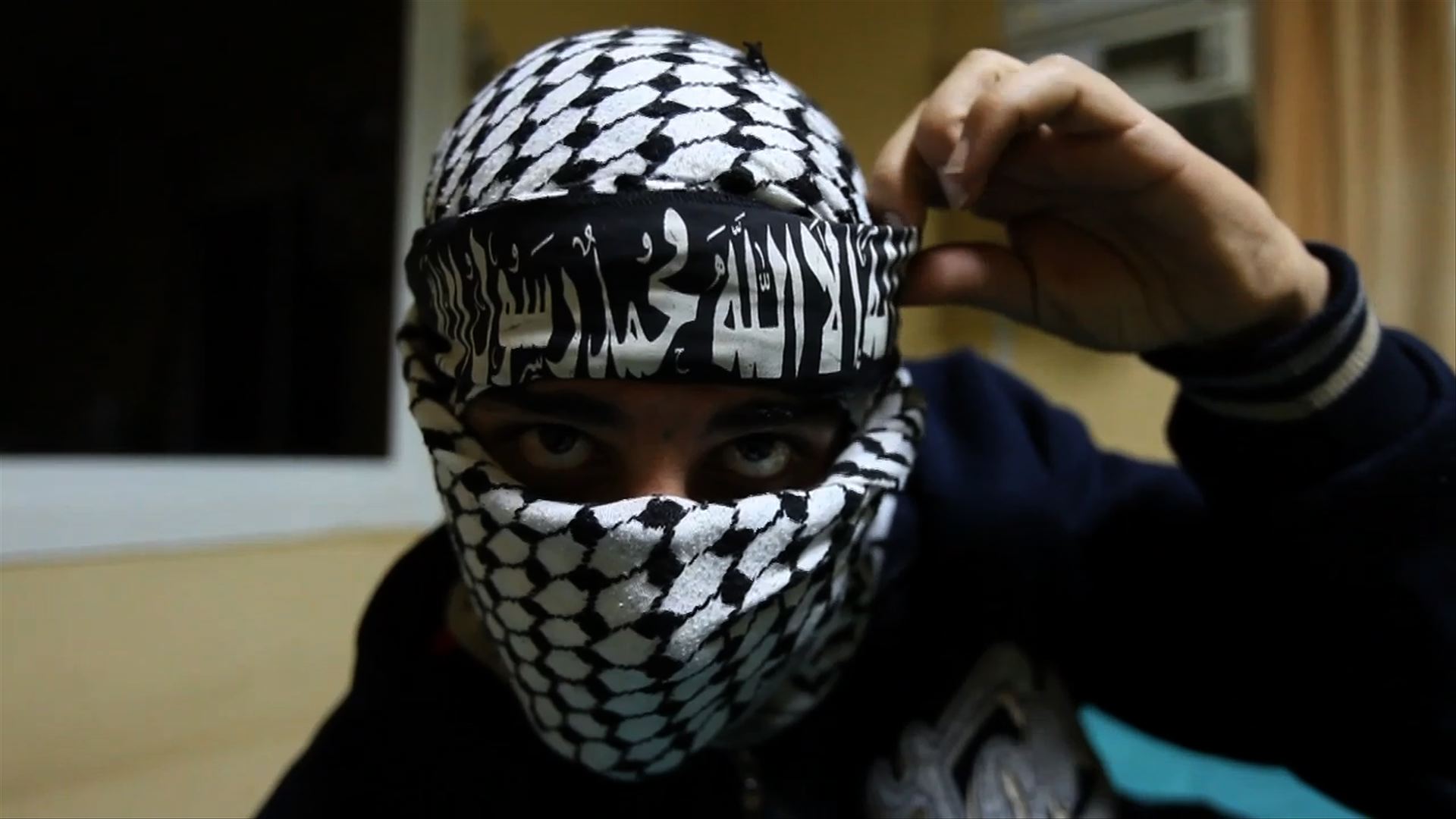In the porous border between Lebanon and Syria words don’t always match actions but young men catch bullets just the same.
Photos: Si Mitchell.
“I am one,” says Ahmed. He holds up a single finger to drill home the point and locks me with his collie dog eyes. Ahmed is an intense 21 year old lad with a close cropped beard who keeps offering me cigarettes until, not wanting to offend him anymore, I take one and smoke it. He digs in his pocket and pulls out a Nokia. “This is my father,” he says, bringing up a photo. “And my brother, my other brother, and my other brother.” He flicks through the pictures. Young men garlanded with flowers lie blue faced in open coffins. “I want to fight,” says Ahmed. “But they won’t let me, because I am the only one of my family left.”
They are the Free Syrian Army (FSA) and they are Ahmed’s family now. Ahmed was a conscript in Bashar al Assad’s regular Syrian Army in Homs – the rebel stronghold city just across the border which is taking the worst battering and putting up the fiercest resistance. When ordered to shoot on his hometown protesters, Ahmed threw down his rifle and fled into the protest.
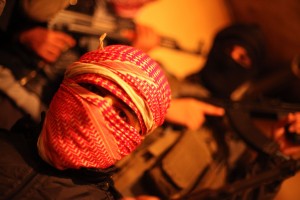
The protesters led him here – an FSA unit in the cloud-shrouded Lebanese highlands near Wadi Khaled – a spur of land protruding like an awkward thumb into its Syrian neighbour’s ribs. Homs lies less than ten miles to the east, a stones throw to the south is Al Qusayr, to the north west Talkalakh, all currently under siege from Bashar al Assad’s security forces.
A teapot simmers on a stocky wood burner and a dozen young men in jeans and jumpers crowd cross-legged around large tin trays and scoop-up handfuls of rice and chick peas with flat Lebanese bread. It’s a more domestic scene than I maybe expected in the guerrillas’ hideout. The door opens and in walks Abu Layth, the snaggle toothed patriarch. He’s significantly older than everyone else, late fifties maybe more. He wears a floor trailing robe and several days of haphazard white stubble and has a red and white keffiyeh piled jauntily on top of his head. We all rise, and there is a great deal of hand shaking and chest touching, some cheek kissing and “Salaam alaykum”s. It’s a simple greeting, but always welcome in these hills. A deal under God, being better than no deal at all.
Abu Layth is the third person I’ve met in as many days who people claim to be the leader of the Free Syrian Army here in Lebanon. But this time, I’m pretty sure I have the right man. Sweet tea is poured and offered – another good sign – and more young fighters arrive. Hamd, one of the three or four the guerrillas in their mid twenties who appear to be the commanders, leans over waving a Blackberry.
“Me,” he says with a grin. The video shows the unit laying waste to a Syrian army post. There is machine gun fire, a house takes a battering. The next clip shows three conscripts kneeling terrified against a wall, one bleeding freely from a still-smoking head wound. Standing, held in an armlock is their officer, an Alawite, from Bashar al Assad’s ruling tribe. Hamd is slapping him round the head.
“What happened to him?” I ask. Hamd shakes his head. “And them?” The conscripts.
“We let them go,” he says.
Two more robed elders arrive and, after greetings and tea, settle down with Abu Layth on the cushions that circle the wood burner for an animated discussion about the previous day’s mission and the price of bullets.
“The Shabiha are charging a fortune for AK47s,” complains the bespectacled new arrival, sparking up a Marlboro. “We were supposed to send seven Kalashnikovs today, but he only brought four.”
The Shabiha are vicious criminal street gangs, armed and paid by Bashar al Assad to terrorise the protest movement, many of whom were released from Syrian prisons for the purpose. In the corner of the room Orient TV plays a loop of a Shabiha thug in Homs pinning a boy to a Pepsi machine and executing him with a handgun bullet to the forehead.
I ask Hamd about the flow of weapons. “It’s normal,” he says. “When we run out of bullets, we buy them off the Shabiha, or from the Syrian military.” I guess it’s the oldest of scams, selling arms to the people you’re fighting. But it’s not the first contradiction I’ve encountered in these hills.
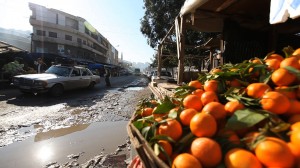
Two days earlier, my mate Radwan gives me a lift to Tripoli – not the Libyan capital, but the Lebanese port town two hours north of Beirut up an ad-plastered highway. There’s none of your spanky duplexes or six inch stilettos tottering around Italian marble shopping malls here – like there is in Beirut. Lebanon’s second city is a pious, Sunni dominated sprawl with a large Syrian population. Many of Syria’s recent refugees have been absorbed by families in Tripoli and the towns around and it’s here, in the compound of an imposing mosque, that we find the Free Syrian Army’s makeshift hospital. When we pull up, two women and a gaggle of kids, refugees from Homs, approach the car to hit us up for money. When we get talking and pull out a camera, a youth with a wispy beard in black army fatigues tears out of the hospital gatehouse and attempts to smash it. I’ve seen serious faced young men like him in Bir al-Abed, Hezbollah’s stomping ground in the south of Beirut. But up here, in the predominantly Sunni north, and outside a hospital treating Syrian fighters wounded in clashes with Hezbollah’s allies in the Syrian regime seems an odd place to find one of their guards.
“They like to keep an eye on what’s going on,” explains Abu Raad, the director of the Syrian refugee mission running the hospital. Abu Raad was a lawyer in the Syrian state’s Higher Authority for Emergencies. Now he’s wanted by the Syrian state for, well, helping Syrians in their time of emergency. “I’ll die before I surrender he says.”
“Or if you surrender.”
“Yes.”
On the ward I meet Ghassan. “I will not wait till this heals,” he says, tapping the plaster cast that’s holding his shattered ankle together. “They say I must stay two months but in one month I will take my Kalashnikov and go back to fight Bashar al Assad.” It’s a brave statement, the Syrian dictator has around half a million of Syria’s nine million workforce in his direct employ, with anything between one and two hundred thousand in the security services alone. The Free Syrian Army estimates its own numbers at around 25,000, but, some say it could be nearer 10,000. Ghassan says he was in a Syrian army unit and was ordered to shoot at the protesters. “I threw down my gun and defected,” he says.
In the bed next to Ghassan lies Nabhan. Nabhan grins and makes a victory sign for the camera. Nabhan was in the same regular army unit as Ghassan and they defected together. In Homs they hooked up with the nascent FSA and were given the job of protecting the protests.
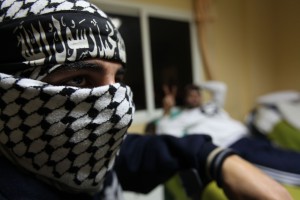
“But the Shabiha and the soldiers attacked us,” explains Ghassan. “We were outnumbered.” In the firefight that followed Ghassan was shot in the leg while Nabhan took a bullet through the penis.
“They brought us over the border on the back of motorcycles,” says Nabhan through a cloud of cigarette smoke. Everyone in earshot looks wide eyed at the tube that protrudes from his groin and disappears under the bed.
“He is addicted to morphine,” says his doctor.
“Yes,” I say. “I imagine he is.”
There are around twenty wounded fighters being treated on the ward. The other patients are civilians, suffering from bullet, shrapnel and shell wounds picked up in the border towns or while trying to flee to Lebanon. As the guerrillas lie in their beds chain smoking, a chattering four year old called Omran drags a patched up leg from room to room picking up cuddles and kisses as he goes.
Omran’s mother explains that he was shot by the Syrian Army as they crossed the border. She had tried to enter Lebanon legally but the Syrians wouldn’t let her leave without a document from the boy’s father and she was scared to tell them he had been killed in the uprising.
“He is the youngest Mondas,” says Ghassan. The littlest spy. Dr Majd hoists the boy onto a bed and removes Omran’s dressing. The bottom half of Omran’s leg has been extensively rebuilt by Lebanese surgeons in the hospital up the road and thick scars criss-cross his tiny limb. A dark, vicious rivet marks the bullet’s entry point. As the doctor applies cream, Omran studies the ceiling, quiet for the first time.
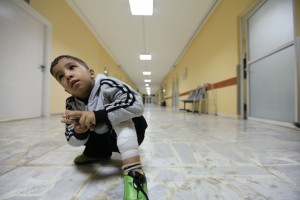
“This man,” explains Dr Mu’tazz, turning to a lad of no more than 22. “He is a fighter. He took bullets here, and here… and here, and here…oh and here.”
A toothless guerrilla holds up a fat white mit for a photograph and tells me he had his thumb shot off.
In the corridors, FSA fighters hobble up on crutches and ask where I am from. “Ah England,” they say. “Tony Blair.”
“Syria,” I respond. “Bashar al Assad.” They take the point and we laugh and they give me cigarettes and we sit on the beds and smoke them with the doctors. Everyone here has a story. Mamoud was in Homs and was shot by a helicopter, he makes a whirring motion with his hand followed by triggers. His leg is swathed in a bulky casing, but no one seems to have told him to stay in bed…or lay off the Gitanes. Rafiq rolls up a sleeve to reveal the entry point of the bullet that snapped his wrist. “Soon I go and shoot again,” he says grinning. More triggers. “Kalashnikov,” he says.
Like Ghassan and every one of the young fighters in here, Rafiq appears to have something that many young men of his generation elsewhere in the world are struggling to pin down. The boys in the hospital may be damaged and locked into one of the most lopsided wars on the planet – as far as resources and weaponry goes – but their eyes sparkle when they talk of the fight, of toppling the tyrant. They are without distraction. No tiresome job, looming dole queue, just departed girlfriend or worries about some distant intangible future clouds their worldview. Unlike most twenty year olds, they know exactly what it is they’re supposed to be doing. They have a purpose.
“Come,” says Dr Mu’tazz shoving a plastic spoon into my hand. “I want you to eat with me.” We sit and dig into a communal foil tray of moghrabieh – giant Lebanese couscous and chick peas. The doctor jumps up and runs into a nearby office, then returns with a bag of kabees, hot pink chunks of beetroot-dyed radish, that he pours onto a plate. “You’re welcome,” he says. “Eat, eat.”
I ask him how it feels patching up young men to send them back into battle. He chews his food and huffs out an edgy sigh. “We will defeat the regime,” he says. “We must.” He tells me he has a wife and two young girls, a four and two year old, back in Baniyas.
“Are they safe?” I ask.
“No they are not,” he says, the thought of their predicament making him stand. “They are in very, very great danger. If the Mukhabarat [Syria’s secret police] finds them, they will…” he hunts for the word, “capture them.”
“Why?” I ask.
“So I should give myself up.”
The next day we head north to Wadi Khaled. We stop to take a picture and get immediately confronted by an agitated local. People are justifiably paranoid about strangers with cameras. Yesterday Syrian agents slid over the border and shot three FSA fighters.
Friday prayers at the Wadi Khaled mosque is a noisy, heartfelt affair. The Syrian sheik conducting the service, Abed al Rahman, lost his wife three weeks ago to a sniper as she tried to cross over. Chests are clutched, tears flow and the sheik’s calls for the faithful “to take up arms and fight the regime that has killed your brothers and raped your wives,” are met with passionate cries of “Allah o akbar’.
“A tank against a young girl?” he shouts. “Al Assad, you are the dirty sperm, the son of pig. Your father killed the fathers and now you kill the sons.”
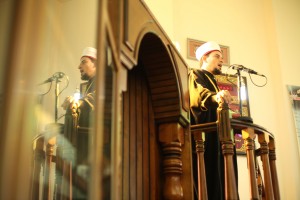
The sheik implores Allah to “paralyse the hands of the torturers” and tells the faithful not to hide their faces from the camera but to take pride in their defiance. It seems you don’t even need to be that faithful. “Even non believers who die fighting this tyrant will go to paradise,” he intones and I wonder if that’s aimed at me.
Up the road from the mosque, around three hundred people are charging down the street shouting “Death to the cockroach al Assad” and waving Syrian, Lebanese and jihadi flags.
“We have come on the street because they killed our soldiers,” barks Khaled eyes blazing behind his Kaffiyeh mask – as much a defense against the mountain cold as against Mukhabarat agents that may be secreted in the crowd. A couple of tractor tyres are torched and small boys are hoisted onto shoulders to lead complex, frenzied call and response chants that all end in frantic, repeated howls of “Allah o akbar”.
We trundle through what could pass for a sleepy overgrown frontier village, now the de facto Lebanese base of the Free Syrian Army. The road names are less than bucolic: ‘Obey God’, ‘Fear me’, ‘No Fear’, ‘Pray before we prey on you’, and the inimitably titled ‘Remember Death’ street.
We’re invited into the home of Ahmed al Arabi, a portly, balding captain in the Free Syrian Army, who was one of the first to defect from the regular Syrian forces. He was fortunate enough to bring his family with him and sniggering children scurry about the kitchen. He tells us he’s pleased one of his brothers was released from a Syrian jail the previous day. He’d been arrested, along with the rest of the captain’s family, immediately following the captain’s defection. He tells us his brother was tortured and other relatives remain in custody, but he was lucky enough to get his wife and children out. Many defectors aren’t and the regime thinks nothing of imprisoning, torturing or killing defectors’ families. Many of the young conscripts who manage to escape the barracks are caught in their homes and shot.
The captain tells us how the discrepancy in firepower means they have to wage a guerrilla war against the regime. Striking and falling back. What about the rich Sunni countries and ex-pat Syrians who are calling for the overthrow of the regime?
“If there is money it is not getting here,” he says. “Sometimes my men have to go out on patrol without eating.” He says he thinks the head of the local municipality, the Mokhtar, who is distributing funds among the refugees is stealing money. He’s probably right.

Unseen in the kitchen, the captain’s wife produces Hamud, green leaves with chicken, and we sit around a tray on the floor and drench it with lemon juice and scoop it up with rice and bread. On the television, protesters in Homs show orange vested Arab League representatives their scar-striped backs.
“If we had a no fly zone, we could create a safe area, then many more officers and soldiers would defect as they could bring their families and make them safe. I am sure of that,” he says.
The lights go out, but a torch hangs from the ceiling ready for the power cut and the captain’s teenage son turns it on and we drink more sweet tea before making our goodbyes. As I’m leaving, Ahmed’s phone rings on a side table. I pass it over and notice that its flashing screensaver is an image of a Kalashnikov crossed with a sword and the words, ‘Jihad til death’.
“What do you think of Islam?” asks Ahmed, the one, in his intense, insistent manner and Abu Layth’s young fighters watch for my response.
“Er…it’s…” It’s quite a loaded question in this company. Everyone I meet in the resistance is keen to talk about revolution, freedom and democracy, but I’m yet to meet a revolutionary who isn’t a Sunni Muslim and the battle lines in Syria appear to be falling along ancient divisions.
“I…” The group falls quiet. “It evidently binds you together,” I say. The boys check each other to see if my answer is a diss or not. I clasp my fingers together by way of translation. “It gives you unity.” It may not have been the ovation they were angling for, but a few of them nod in what I read as tacit approval.
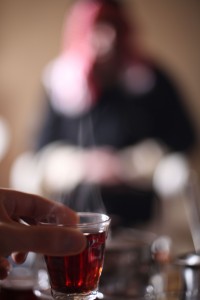
“Not just?” Ahmed makes trigger motions.
“No,” I say. “Not just.”
I don’t doubt all sides on this conflict, like every other before it, believe they are being backed by the supreme authority. The leading Shia powers in the region, Iran, and Lebanon’s Hezbollah, have both sided with the Assad regime, while the southern Sunni states of Saudi Arabia, UAE and Qatar appear tentatively excited about their arch Shia rivals becoming isolated. When Hassan Nasrallah, Hezbollah’s leader, made a rare public appearance in December to back the Syrian dictator a few eyebrows were raised – Hezbollah being the resistance movement to top all resistance movements – but Assad is Hezbollah’s supply line for armaments and without them they fear, probably correctly, that they’d be more vulnerable to Israeli attack. The Palestinian group Hamas have played a more diplomatic hand, withdrawing their leadership from Damascas and generally trying hard not to discuss the Syrian issue. Tunisia and Egypt, for their part, are moral if not active supporters of the Syrian revolution and have cut their ties with Hezbollah as a result.
Whether Hezbollah are actively involved in the Syrian repression is debatable, but they have been rounding up Syrian dissidents and rendering them back across the border. One recent attempt to grab a Syrian fugitive from the Lebanese village of Aral in the Beqaa valley ended badly for Hezbollah when the villagers, well armed borderland smugglers, got wind of their arrival and took out Hezbollah’s convoy with a couple of RPGs.
The boys from Wadi Khaled say they know foreign mercenaries are fighting alongside the regime and show me a video of bearded ‘Syrian’ soldiers they killed. “The Syrian army makes you shave,” they explain. “These men are Iranians.” Perhaps.
The mistrust of beards runs deep in both camps. In a safe house in Tripoli, I find Abu Musaab, a bearded Sunni Syrian who spent 90 days being tortured in the bowels of the Baniyas football stadium. “They believed I was the local prince,” he says. The prince, being a kind of local Sunni leader. “They put us in the Faroush,” he says making a turning motion with his hand. I get it, every corner in Tripoli sports a glass fronted oven with whole chickens spinning slowly on a spit. Abu Musaab’s Faroush involved him having a car wheel strapped to his neck then getting trussed up on a spit-like bar while the guards beat him with kerbajs, whipping sticks made of wood and rubber. “After two days I signed a confession,” he says. It didn’t stop.

In West Beirut I run into Majd Salim, a Palestinian from Damascas. Like the vast majority of the million Palestinian refugees living in Syria, neither Majd nor his parents have been to the village in the Golan they call home, the village his grandparents fled during the Six Day War with Israel.
“What about the Palestinians?” I ask, assuming any displaced nation with a pedigree of resistance like theirs must be about to pick up the guns and join the rebellion.
“Most Palestinians want the regime to stay,” says Majd.
“What?”
“They have a good life in Syria,” he says. “They can work, they live like equals with the Syrian people. They fear that if the regime goes, they will end up living like they do in Lebanon – despised, in camps, with no work, no money.”
We roll down to Chatila, a 44 year old Palestinian refugee camp in the heart of Beirut where for 20,000 Lebanese Lira the camp tattooist will etch a likeness of Bashar al Assad onto any patch of skin you care to expose.
In his office, reclining beneath a poster of Yasser Arafat, the godfather of the Palestinian Liberation Organsiation (PLO), we find the camp’s PLO General Secretary, Ghasan Hasan, who tells us in articulate English, “The PLO supports strong Arab states because strong states support our struggle.” But what about the Palestinians who were killed in the Syrian port of Latakia when Assad shelled the Ramel refugee camp in August? “What’s happening in Syria is for Syria.”
Maybe the PLO’s line isn’t so surprising. The Palestinians got involved in the Lebanese civil war and paid a high price for that, not least here in Chatila – (in1982 the Israeli military sealed the camp while the Christian Phalange militia butchered every man, woman and child they could find).
Nothing is straight forward. Away from the all night bars spilling Beirut’s catawauling crowd of cocktail swillers onto Gemmayzeh’s car clogged streets, Lebanon enjoys a tentative peace. Every religious group and factional subgroup maintains a foothold in the governance of the nation – there is even a quota system for the distribution of roles, from the Maronite Christian President to the Sunni Prime Minister and Shia speaker of the house down. The silent threat of each group’s armed wing means no one group dominates. As much as the Palestinians might choose to support external struggles on moral terms, at the end of the day, like Hezbollah, Israel and the other myriad groups who stand to be affected by the unfolding conflict in Syria, the Palestinians are first and foremost watching their own back.

In the street outside the PLO’s office I’m introduced to Abu Moussa, the leader of the Popular Front for the Liberation of Palestine, the Palestinians’ Marxist Leninist faction. Abu Moussa’s takes us to his office where Bashar al Assad stares down from the walls, and tells us stony faced: “We support the regime without question.”
For those without party cards, positions are not so cut or dried. The falafel stalls lining Chatila’s alleyways appear to be run almost exclusively by Palestinians from Syria and all the stall holders I speak to are opposed to the regime. Though none will pose for a photograph.
“Go and see Um Ahmed,” I’m told, and led up some stairs to a small flat full of caged birds where Um Ahmed, a Syrian Alawite grandmother and unapologetic supporter of the rebellion lives with her Palestinian Syrian Sunni husband, a stout, if slightly hen-pecked, defender of the regime. Bear in mind that the Alawite’s are Bashar al Assad’s tribe – the minority who dominate both Syria and the regime and it is the Sunnis who provide the heart and soul of the resistance. I’m starting to get used to it – the only consistencies being the inconsistencies. The old couple kindly invite us in, but within minutes of us bringing up the Syrian revolution the air is thick with their quarrelling. When we leave Um Ahmed is telling her husband, “If you don’t like it, go back to Syria.”

Jump in a rattling minivan and ten minutes later you’re in the black-flagged Shia suburb of Aret Hriek. You get arrested for asking questions in this neighbourhood, so when Hezbollah don’t respond to my request, I get Harakat Amal, another big hitter Shia party, to provide the chaperone. Down here, there’s no shortage of Syrian, or Lebanese, who say they support the Assad regime wholeheartedly and one or two who say they’d fight for it if called upon. But one Shia old lady I ask blushes and shrugs and eyes the Amal man and the small crowd that’s gathered and says, ‘What else can I say?’
Nothing is straight forward.

“Of course the majority of the opposition is Sunni,” says Rami Khouri, when I catch up with him outside the Public Policy Institute he directs at the American University of Beirut. “Because the majority of Syrians are Sunnis, in the same way the Polish resistance in World War II was mostly Catholic. But I think it is a mistake to see this as a Sunni-Shia thing. An element of that might come into play down the road if the Muslim Brotherhood play a bigger role, but primarily it’s a citizen revolt after 40 years of minority rule.”
“It is like Europe in 1918. It’s our time for revolution,” says Majd Salim. “Maybe the Islamists will get power for a bit, maybe it’ll take one hundred years. We don’t even have civilization yet. First civilization, then freedom.”
Lebanon’s wealthy, Sunni, Future Movement party are keen to be seen to support the resistance. Their blue flags flap about at every pro revolution demonstration, and they have money – check them poncing around Downtown Beirut in their giant Mercedes cars and Armani jackets throwing up ostentatious apartment buildings with Gulf state petrodollars. The resistance needs ammunition, the maths appears straight forward, but instead the Future Movement give them laptops, one for every refugee that crosses the border.
And, lets not forget Al Queda, the most extreme Sunni contingent, who are also present in Lebanon undertaking a re-branding exercise and becoming the Abdullah Azam Brigades. That said, despite the dubious bombs in Damascas – from which Syrian state TV was broadcasting within live within moments of the blast – they don’t appear overly keen to involve themselves in the Syrian struggle.
In the hospital Ghassan plays piercing jihadi tunes on his Nokia. He dutifully scarves up for a photo – faces are off limits, as identification puts everyone, family members included, in danger – but the headband that reads “There is no God but Allah, there is no prophet but Mohammed,” he was wearing when we arrived. A Koran is produced which he starts kissing and touching to his forehead.
“What about Hezbollah?” I ask.
“Hezbollah will fall along with the regime,” he says.
“Because they are Shi’ite?”
“No,” he says. “When I was wounded I was helped by Shi’ites. Hezbollah will fall because they are supporting the regime.” Which is pretty much what the kids mobbing Wadi Khaled high road were chanting too.
A couple of days later I’m sat in a Beirut coffee shop talking to Mohammed and Dr Mazn. Mohammed is a swarthy ringer for the young Che Guevara who wears a constant, infectious grin and his bushy black eyebrows caper around his forehead when he speaks. He tells me he was a school teacher in Syria but now he’s the communications man for the Syrian Refugee Council in Lebanon – which means, he receives a daily supply of brutality on SD cards smuggled through the Syrian/Lebanese hills which he then uploads to Youtube.
“Wait,” he says, digging in his pocket. He pulls out a Blackberry and holds it up, laughing. Needless to say the photo on the screen isn’t that funny. It’s of his legs – a pair of livid, purple hams, sliced and swollen from the beating he received in the bowels of the Baniyas football stadium. Like Abu Musaab, the prince, Mohammed was scooped up along with every other male of smoking age – and that’s not so old in these parts – in Baniyas following an anti regime protest there in May.
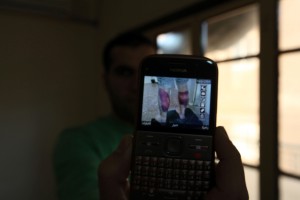
Beside Mohammed sits, Dr Mazn, a 23 year old dental school graduate who finished university three weeks before Syria erupted. He’s also from Baniyas and he also felt the sticks in the stadium. “We saw the Arab Spring in Tunisia and Egypt,” he tells me. “We always wanted freedom and democracy but it made us believe it could happen.” Dr Mazn fiddles with his well gelled curls and looks every part the young intellectual liberal dentist he never quite became. He tells me proudly that Baniyas “was the second city after Dera’a to rise up.” Dr Mazn is the Refugee Council’s aftercare man in Tripoli, managing safe houses for the refugees and fighters when they are released form the hospital. When I ask him about the sectarian aspect to the conflict he says, “Look at Turkey, they have lots of religions and there’s no war.” Between Mohammed and Dr Mazn sits 23 year old Sulafa, originally from Aleppo in the north of Syria, she was working at a Saudi TV station when protesting Syrians began to be cut down in the streets. She dropped everything and flew to Lebanon to act as the Refugee Council media officer. “There’s no going back,” she says, sharp and confident in shocking pink headscarf and matching eye shadow. Mohammed grins in agreement. They order hot chocolates. They don’t look like they’re about to enter an alliance with the Abdullah Azam Brigades.
Back in Abu Layth’s house, the young guerillas, put on uniforms and mask up for photographs. Later, they hatch a game plan, pray for success, then shoulder their Kalashnikovs and climb three up onto tiny Chinese motorcycles with anti-tank mines under their arms and bump haphazardly over muddy farm tracks into Syria. My phone pings and I check the message. ‘From MTN Syria,’ it says. ‘Welcome to Syria. Feel at home while you roam. The Ministry of Tourism welcomes you in Syria. Please call 137 for tourism information or complains [sic].’ I consider dialing. The lads park up the bikes and scurry goat-like through the night cloaked crags. After a while one of them drops and begins hacking at the ground with a hunting knife. The ground is hard and stony and in the end the mine gets half buried then covered over with mud and grit. The boys say the path is regularly used by Syrian tanks. Further along there’s a rutted road and the other mine is dropped into a deep puddle.
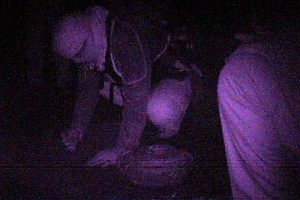
“Is that a good idea?” I ask.
“This road,” they say. “Is only used by the Syrian army.”
“What if the puddle dries out?”
“Someone will come and add more water.”
Back at the house, the young guerrillas lounge on cushions smoking a narghile pipe. The thick, sweet apple smoke fills the room, already airless from everyone’s constant chain smoking. The young fighters drape themselves on each others’ shoulders like teenage girls from Brighton.
Omar, a 19 year old former Shilka tank gunner who fled his unit after being told to shoot at protesters in Hama, makes space for me to sit, giving me the pipe and pulling out his mobile to take a picture of the two of us which he shows the group. He starts flicking through the videos on his mobile, but I wave it away. I’ve seen enough brutality. “Look,” he says, and holds up the phone where a jewel encrusted Bollywood beauty dances suggestively and mimes a Hindi love song. We laugh and switch from theology to discussing the particular merits of Arab, Indian and Western women. They are, after all, just lads.
When I take my leave of Dr Mu’tazz tending carefully to his bomb blasted flock in the Triploi hospital he looks wired and drained but far from hopeless. He shoves a pink radish in his mouth and follows it with a cigarette. “When the uprising began,” he says. “I was working in Saudi Arabia, but I quit my job and came here.”
“You were a doctor in Saudi Arabia?” I ask.
“No,” he says. “I was a veterinarian.” I study his face to see if he’s joking. “I am a veterinarian,” he says and we laugh. He shakes my hand. “I will see you in the new free Syria when Bashar al Assad is gone,” he says.
“Inshallah,” I say.
“Yes,” he says. “Inshallah.”
ENDS
